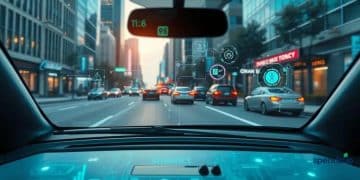Buying a car in 2025: Trends, tips, and changes in the car buying process

If you’re thinking about buying a car in 2025, it’s essential to understand the trends that will shape the industry and how the process will look different from what you might be used to.
The car buying process has undergone significant changes over the past few decades, with technological advancements, shifting consumer preferences, and evolving financial options all playing a role.
In this guide, we’ll explore the most important trends and changes in the car buying process in 2025, including the rise of online car shopping, the shift toward electric vehicles (EVs), new financing options, and the impact of technology on how cars are sold.
Whether you’re a first-time buyer or upgrading your current vehicle, understanding these changes will help you make informed decisions when purchasing a car in 2025.
How the car buying process has changed
The way we purchase cars today is much different than it was just a decade ago.
The traditional dealership visit, where you would test drive a car, negotiate with a salesperson, and go through the paperwork in person, has evolved significantly.
1. Online Shopping and Virtual Showrooms
The most significant change in the car buying process is the shift toward online shopping. Consumers now have access to virtual showrooms, where they can view car models, compare prices, and explore vehicle features without stepping foot into a dealership.
Many car manufacturers and dealerships now offer online tools that allow customers to customize their vehicles, check availability, and even schedule test drives from the comfort of their home.
Additionally, digital retailing platforms are allowing consumers to complete the entire car-buying process online, from choosing the vehicle to finalizing the payment and delivery details.
2. The Rise of Electric Vehicles (EVs)
As we approach 2025, one of the most notable shifts in the automotive industry is the increasing popularity of electric vehicles.
Electric cars, once seen as a niche market, are becoming more mainstream due to advances in technology, government incentives, and growing environmental awareness.
Consumers are becoming more concerned about their carbon footprints, and as a result, the demand for EVs is expected to continue growing.
According to Investopedia, by 2025, EVs will likely account for a significant portion of car sales. Major automakers, including Tesla, GM, and Ford, are heavily investing in electric vehicle technology and infrastructure.
The development of EV charging networks and longer-lasting batteries has helped make electric cars more practical for everyday use. In fact, many consumers will be considering EVs as a primary option when shopping for a new vehicle.

Trends to watch when buying a car in 2025
As we move into 2025, several market trends will significantly impact car buying decisions. Below, we’ll discuss some of the most important trends to keep an eye on when purchasing a vehicle.
1. Technological Advancements in Cars
Cars in 2025 will be equipped with cutting-edge technology that enhances safety, convenience, and the overall driving experience.
From advanced driver-assistance systems (ADAS) to in-car entertainment, connectivity, and autonomous driving features, technology will play a central role in car purchases.
For example, many cars will come with semi-autonomous driving features that allow the car to handle some driving tasks, such as lane-keeping assistance, adaptive cruise control, and automatic parking.
In addition, you can expect more vehicles to offer wireless connectivity for seamless integration with smartphones, enabling features like remote control of car functions and real-time diagnostics.
2. Subscription Services and Flexible Ownership Models
In addition to the traditional ownership model, the rise of subscription-based services will offer a new way to “own” a car.
Vehicle subscription services allow consumers to pay a monthly fee to drive a car, with the flexibility to switch vehicles according to their needs.
This new model eliminates the hassles of ownership, such as maintenance, insurance, and depreciation.
Several automakers have already begun testing subscription models, including Volvo and Porsche.
These services are expected to grow in popularity as more consumers seek flexible, hassle-free options.
3. Vehicle Financing and Loan Options
While traditional financing options, such as loans and leases, are still available, the financing landscape is expected to evolve by 2025.
More consumers will opt for digital car loan applications, as banks and lenders invest in digital platforms that simplify the process of securing financing.
Another trend to watch is the growing use of blockchain technology for vehicle financing. Blockchain can help streamline the financing process, making it easier to track loans, payments, and vehicle ownership records.
This technology has the potential to reduce fraud and errors in car transactions, making the financing process more transparent and secure.
How to prepare for buying a car in 2025
While the process of buying a car in 2025 will be more convenient than ever, there are a few key steps to follow to ensure you’re fully prepared for your next purchase.
1. Research Your Options
Whether you’re interested in a traditional gas-powered vehicle or an electric car, the first step is to research your options.
Use online resources like vehicle comparison tools and reviews to narrow down your choices based on features, safety ratings, and fuel efficiency.
Keep in mind that the popularity of EVs is expected to increase by 2025, so take the time to learn about available electric vehicle models.
2. Understand Financing and Payment Options
Before you start shopping, it’s essential to understand your financing options. Whether you’re considering a loan, lease, or subscription service, make sure you know what you can afford and what terms are available.
With digital loan applications becoming more common, you can easily compare rates from different lenders without leaving your home.
Additionally, if you’re interested in an EV, you should also be aware of government incentives and rebates that may be available to reduce the overall cost of the vehicle.
3. Consider the Long-Term Costs
When buying a car in 2025, it’s important to consider the long-term costs beyond the initial purchase price.
While electric vehicles have lower maintenance costs than gas-powered cars, you should also factor in the cost of charging equipment, insurance, and potential battery replacements.
For consumers interested in subscription services, it’s also essential to understand the costs associated with switching vehicles or canceling the service.
Subscription models may offer more flexibility, but they can also be more expensive in the long run.
Frequently Asked Questions (FAQ)
- Will electric vehicles be more affordable in 2025?
Yes, the cost of electric vehicles is expected to continue decreasing by 2025 due to advancements in battery technology and increased competition in the market. Many governments also offer incentives for EV purchases, further reducing costs.
- Can I buy a car entirely online in 2025?
Yes, many dealerships and manufacturers are offering online car buying platforms that allow you to complete the entire purchase, from selecting a vehicle to financing and delivery, without stepping foot into a showroom.
- Are car subscription services worth it?
Car subscription services can offer great flexibility, but they may be more expensive than traditional ownership or leasing. It depends on how often you plan to switch vehicles and whether you prefer the convenience of all-inclusive payments that cover maintenance, insurance, and more.
- Will self-driving cars be available in 2025?
While fully autonomous vehicles may still be in development, some cars in 2025 will likely include advanced driver-assistance features such as self-parking and semi-autonomous driving capabilities. Full autonomy will still be in testing for the next few years.

The car buying process in 2025 will be vastly different from what we’ve experienced in the past.
With the rise of online shopping, the growing popularity of electric vehicles, and advancements in car technology, buying a car will be more convenient, flexible, and personalized than ever before.
As the industry continues to evolve, it’s important to stay informed about the latest trends and options available to you.
By conducting thorough research, understanding your financing options, and keeping an eye on market trends, you can make an informed decision when buying a car in 2025.
Whether you’re purchasing a traditional vehicle or embracing the electric future, the next few years will offer exciting new opportunities for car buyers.





